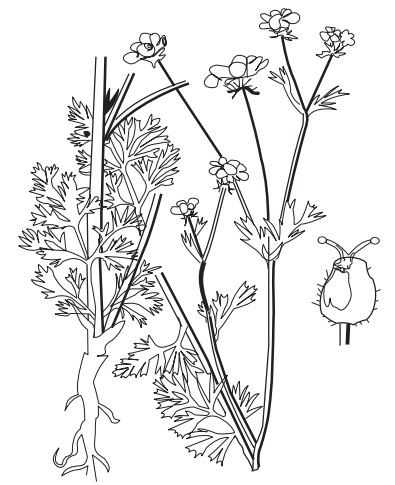Ajowan
| Home | | Pharmacognosy |Chapter: Pharmacognosy and Phytochemistry : Drugs Containing Volatile Oils
Ajowan is the dried ripe seeds of Trachyspermum ammi (L.) Sprague, belonging to family Apiaceae.
AJOWAN
Biological Source
Ajowan is the dried ripe seeds of Trachyspermum ammi (L.) Sprague, belonging to family Apiaceae.
Geographical Source
It is a native of Egypt and grown through out India,
Mediterranean region and in south-west Asian countries such as Iraq, Iran,
Afghanistan, and Pakistan.
Cultivation and Collection
Ajowan is an erect, glabrous or minutely pubescent, branched
annual herb, up to 90 cm tall. The crop is grown in cold weather, both as a dry
crop and under irrigation. It grows on all kinds of soil, but does well on
loams or clayey loams. Seeds are sown broadcast in the moist soil from
September to November. Germination takes in 5–15 days, depending upon climatic
conditions. First irrigation should be light. The flowering takes place in
about two months. The harvesting period is February or March. The fruits become
ready for harvesting when the flower heads turn brown. The plants then pulled
out by the roots and dried. The dried fruits are separated by carefully rubbing
with hands or feet.
Characteristics
The drug occurs as entire cremocarps or separated
mericarps. Cremocarps are ovoid-cordate to ovate, laterally compressed; 1.7–3.0
mm long; 1.5–2.4 mm broad, dirty yellow to yellowish brown in colour and half
to two-thirds apical portion has slight purplish tinge. At the top of the
cremocarp is a bifid stylopod surrounded by five minute sepals. Each mericarp
shows five light-coloured ridges and is covered with light yellow
protuberances. The drug has an agreeable odour and aromatic and warming taste.

Chemical Constituents
Ajowan contains an essential oil (2–3.5%), protein (17.1%),
and fat (21.8%). Ajowan oil is a colourless or brownish yellow liquid
possessing a characteristic odour of thymol and a sharp taste. The principal
constituents of the oil are phenol, mainly thymol (35–60%), carvacrol,
p-cymene, γ-terpinene, α-, and β-pinenes and dipentene. The fatty oil is composed of palmitic, petroselinic, oleic, linoleic,
and 5,6-octadecanoic acids.
Uses
Ajowan is widely used as a spice in curries; in pickles,
certain types of biscuits, confectionery, and in beverages. It is valued for
its antispasmodic, stimulant, tonic, and carminative properties. It is given
in flatulence, atonic dyspepsia, diarrhoea, and cholera. It is used most
frequently in con-junction with asafoetida, myrobalans and rocksalt. Ajowan is
also effective in relaxed sore throat and in bronchitis, and often constitutes
an ingredient of cough mixture.
Ajowan oil is used as an antiseptic, aromatic, carminative,
for perfuming disinfectant soaps, and as an insecticide. The oil is useful as
an expectorant in emphysema, bronchial pneumonia and some other respiratory
ailments.
Marketed Products
It is one of the ingredients of the preparation known as
Aptikid (Lubin Herbal Laboratory).
